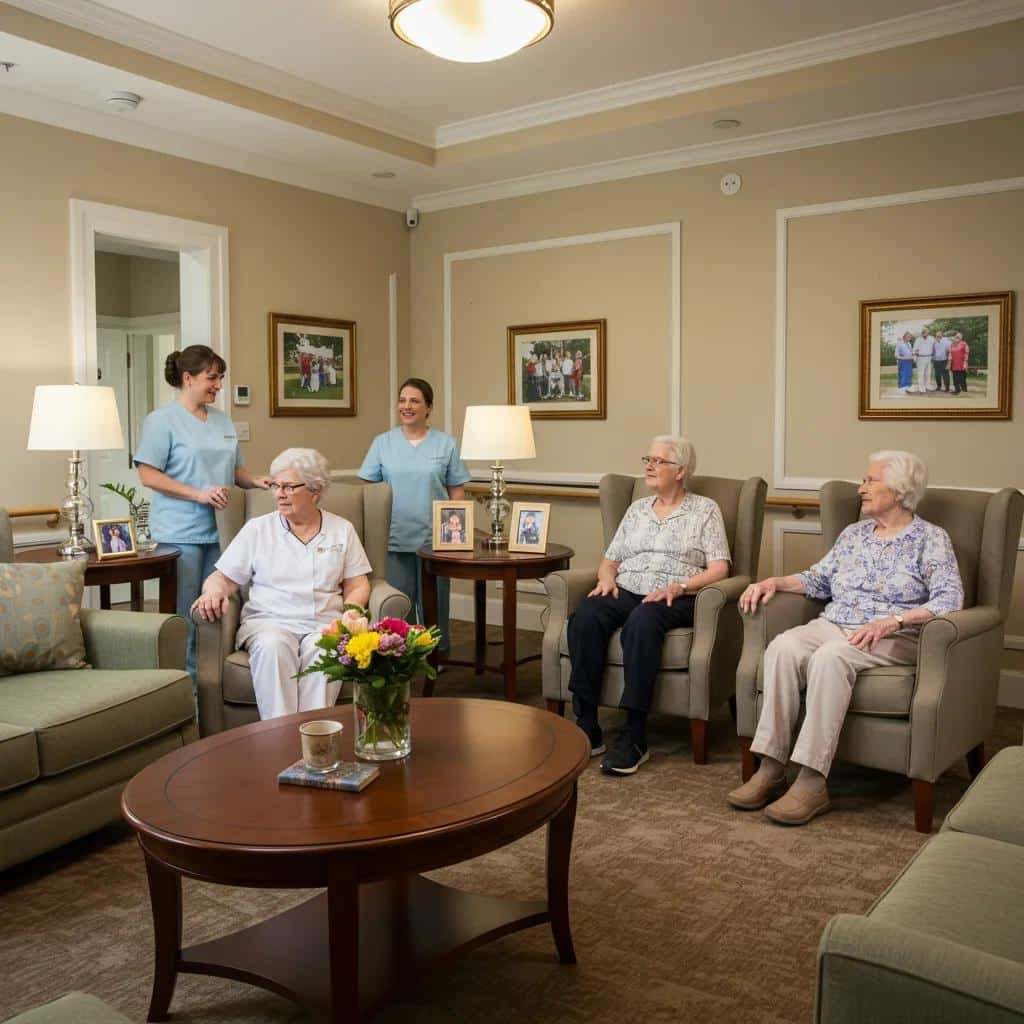Discover the best dementia care facilities Sacramento. Compare options, costs, and support for your loved one. Make an informed choice.

Discover Local Memory Care Facilities for Your Loved Ones
Discover Local Memory Care Facilities for Your Loved Ones

Understanding Memory Care Services for Your Loved Ones: What You Need to Know
Memory care services provide specialized residential support for individuals living with Alzheimer’s disease and other forms of dementia, ensuring safety, structured routines, and therapeutic engagement in a familiar setting. For families searching for “memory care facilities in my area,” understanding these services can ease the stress of care decisions and connect loved ones with tailored support. This guide explains what memory care entails, who benefits, key advantages, cost considerations, decision indicators, and selection criteria for the right facility. You’ll also discover how Memory Lane Assisted Living’s home-like ranch house model in Ypsilanti and Ann Arbor offers compassionate, expert memory care, and what makes its small staff-to-resident ratio and specialized training stand out. Whether you’re exploring financial planning, evaluating behavioral changes, or preparing for facility tours, this comprehensive overview equips you with actionable insights and next steps for securing the best memory care for your family.
What Is Memory Care and Who Benefits from It?
Memory care is a specialized form of residential support addressing cognitive impairment by combining 24-hour supervision, structured activities, and secure environments. It’s designed for individuals with progressive memory disorders who require daily assistance beyond what assisted living offers. By focusing on therapeutic engagement and personalized routines, memory care enhances quality of life and eases family caregiver burdens.
What Conditions Does Memory Care Address?
Memory care addresses a range of neurocognitive disorders that impair memory, behavior, and daily functioning.
Common conditions include:
- Alzheimer’s disease, characterized by progressive memory loss and disorientation.
- Vascular dementia, resulting from reduced blood flow to the brain.
- Lewy body dementia, marked by visual hallucinations and motor impairments.
- Frontotemporal dementia, affecting language and behavior control.
- Mixed dementia, involving overlapping Alzheimer’s and vascular changes.
These tailored services support individuals across stages of cognitive decline, ensuring consistent routines, safety measures, and cognitive stimulation that reduce anxiety and enhance engagement.
How Does Memory Care Differ from Assisted Living?
Memory care differs from assisted living by offering enhanced security, specialized staffing, and programs focused on cognitive needs rather than general independence.
This comparison shows that memory care provides a higher level of specialized support, structured routines, and secure design essential for residents with dementia.
What Specialized Support Does Memory Care Provide?
Memory care delivers comprehensive services that transcend standard assisted living by integrating medical oversight, cognitive therapies, and environmental adaptations. Key supports include:
- 24-hour supervision ensuring immediate response to safety risks.
- Cognitive stimulation programs such as art, music, and memory exercises.
- Secure perimeters and wander-management systems to prevent elopement.
- Assistance with activities of daily living, including dressing, bathing, and medication management.
- Personalized care plans that adapt to evolving cognitive and physical needs.
These services work together to promote independence where possible and protect residents from harm, bridging medical oversight with therapeutic engagement to improve overall well-being.
What Are the Key Benefits of Memory Care for Your Loved Ones?

Memory care enhances safety, cognitive function, social engagement, and family support through specialized programs and secure environments. Families benefit from peace of mind knowing loved ones receive expert attention in a setting designed for dementia needs.
How Does Memory Care Enhance Safety and Security?
Memory care enhances safety by combining secure facility design with trained staff and monitoring technologies. Doors and windows feature controlled access systems to prevent wandering, while motion sensors and alert systems detect unusual activity. Staff-to-resident ratios allow immediate intervention in falls or emergencies, reducing hospitalization risk. Environmental adaptations—such as clear wayfinding, minimal distractions, and soft lighting—minimize confusion and agitation. This secure framework supports residents’ autonomy while safeguarding against common hazards, directly contributing to reduced injury rates and greater caregiver confidence.
In What Ways Does Memory Care Support Cognitive Function?
Memory care supports cognitive resilience through structured, evidence-based activities that stimulate different brain regions. Therapeutic programs include:
- Group reminiscence sessions that reinforce personal history and social bonds.
- Art and music therapy engaging sensory pathways linked to memory recall.
- Cognitive exercise workshops using puzzles, games, and memory drills.
- Physical movement classes that combine motor coordination with mental tasks.
- Sensory stimulation rooms offering tactile and visual exercises.
These interventions maintain neural connectivity, slow cognitive decline, and foster a sense of accomplishment and engagement, building on research that consistent stimulation can enhance memory retention.
How Does Memory Care Improve Social Interaction and Quality of Life?
By fostering small-group activities and communal spaces, memory care encourages meaningful connections and emotional well-being. Residents share meals in home-style settings, participate in themed social events, and engage in intergenerational programs that strengthen community ties. Consistent routines and familiar faces reduce anxiety, enabling residents to relax and interact more freely. These social interactions combat isolation, increase morale, and support emotional health, leading to improved daily moods and a greater sense of belonging.
How Does Memory Care Provide Relief and Support for Family Caregivers?
Memory care offers family caregivers crucial respite and emotional support by entrusting daily cognitive and physical care to trained professionals. Scheduled family education workshops and support groups equip relatives with strategies for effective communication and stress management. Regular progress updates and care conferences foster transparency and collaboration between families and care teams. This collaborative approach alleviates caregiver burnout, reinforces confidence in care decisions, and allows families to focus on meaningful visits rather than daily caregiving tasks.
What Are the Signs That Indicate It’s Time for Memory Care?
Recognizing the need for memory care hinges on observing safety risks, behavioral changes, and declines in daily functioning. Early identification leads to timely intervention, optimizing resident well-being.
What Behavioral Changes Suggest Memory Care Is Needed?
Behavioral shifts such as increased confusion, repetitive questioning, aggression, and wandering signal that specialized memory support is essential.
Common indicators include:
- Unexplained exit attempts or getting lost in familiar places.
- Sudden mood swings, irritability, or verbal outbursts.
- Repetitive routines or persistent forgetting of appointments.
- Difficulty recognizing familiar people or places.
Addressing these behaviors within a secure, structured environment reduces safety hazards and emotional distress, paving the way for improved quality of life.
How Does Decline in Daily Living Activities Signal Memory Care Needs?
A noticeable decline in performing activities of daily living—such as bathing, dressing, meal preparation, and medication adherence—reflects the progression of cognitive impairment. Struggling with hygiene tasks, forgetting to take medications, or leaving appliances unattended can pose serious risks. Memory care provides consistent assistance and monitoring to maintain health, reduce safety incidents, and support dignity through respectful, person-centered routines.
When Should Families Consider Transitioning to Memory Care?
Families should consider memory care when caregiver stress becomes unmanageable, safety concerns escalate, or medical professionals recommend enhanced supervision. Indicators include caregiver exhaustion, frequent emergency room visits, and visible deterioration in the loved one’s physical or mental condition. Early transition allows for smoother adaptation, personalized plan development, and uninterrupted therapeutic engagement.
How Much Does Memory Care Cost and What Are Your Payment Options?
Understanding the financial investment in memory care is critical for planning and accessing available resources. Costs vary by region, services included, and facility features, but transparent breakdowns aid informed decision-making.
What Is the Average Cost of Memory Care in 2025?
National averages for memory care in 2025 range between $6,450 and $7,785 per month, depending on location and amenities.
These figures reflect the specialized staffing, therapeutic programs, and secure environments integral to quality memory care.
What Factors Affect Memory Care Pricing?
Several variables influence monthly fees, including geographic demand, facility size, program offerings, staff-to-resident ratio, and the complexity of medical and behavioral support required. Premium amenities—private suites, specialized therapies, and advanced security systems—can also elevate costs, while nonprofit or smaller communities may offer competitive pricing through local partnerships.
What Payment Methods and Financial Assistance Are Available?
Families can explore multiple payment sources to cover memory care expenses:
- Medicaid waivers for eligible low-income individuals.
- Medicare for short-term skilled nursing and therapy stays.
- Veterans Administration benefits for qualifying veterans.
- Long-term care insurance policies designed for memory support.
- Private pay through personal savings, retirement funds, or asset liquidation.
Combining these options often yields a balanced approach to funding memory care.
How Can Families Plan Financially for Memory Care?
Effective financial planning begins with reviewing insurance coverage, consulting eldercare financial advisors, and establishing budgets aligned with projected costs. Researching state assistance programs, exploring veterans benefits early, and discussing payment plans with facility financial counselors can mitigate stress. Building a dedicated care fund well before transition ensures resources are available when memory care becomes essential.
How to Choose the Right Memory Care Facility for Your Loved One?

Selecting an appropriate memory care community involves evaluating environment, programs, staffing, and location to match individual needs and preferences.
What Facility Features Should You Look For?
Key features to prioritize include:
- A home-like environment with familiar décor and clear wayfinding.
- Secure indoor and outdoor spaces to support safe exploration.
- Low staff-to-resident ratios for personalized attention.
- Structured daily schedules balancing therapy, recreation, and rest.
- Certified dementia care specialists trained in behavior management.
These features together create a supportive atmosphere that fosters comfort and cognitive engagement.
What Questions Should You Ask During Facility Tours?
When touring prospective memory care settings, ask about:
- Staff training standards and ongoing education in dementia care.
- Individualized care plan development and review processes.
- Emergency response protocols and medical oversight arrangements.
- Family communication methods and involvement opportunities.
- Availability of specialized therapies, social programs, and community events.
These inquiries reveal operational philosophies and care quality, guiding confident decisions.
How Does Memory Lane Assisted Living Stand Out in Ypsilanti and Ann Arbor?
Memory Lane Assisted Living specializes in dementia support through its unique six-bedroom ranch house model that emulates a familiar household. Small, consistent care teams deliver personalized attention, and program offerings integrate local cultural outings, gardening clubs, and music therapy. This localized expertise nurtures social connections and smooth transitions for residents from the surrounding communities.
What Therapeutic Programs and Activities Are Offered?
Memory Lane’s memory care includes tailored programs such as:
- Creative arts workshops that stimulate memory recall.
- Music and rhythm sessions engaging emotional and auditory pathways.
- Garden therapy encouraging physical activity and sensory enrichment.
- Cognitive fitness classes focusing on memory drills and problem-solving.
- Community integration events linking residents with local initiatives.
These varied activities foster holistic well-being by blending cognitive, physical, and social stimulation.
What Makes Memory Lane Assisted Living’s Memory Care Unique?
Memory Lane Assisted Living’s Memory Care stands out for its holistic approach to supporting individuals living with memory impairments. One of the core elements that sets Memory Lane apart is its personalized care plans, tailored to meet the specific needs of each resident. This bespoke approach ensures that caregivers understand the unique life history, preferences, and interests of every individual, enabling them to foster meaningful connections and engagement. By prioritizing individualized care, Memory Lane effectively nurtures a sense of identity and belonging, which is crucial for residents navigating the challenges of memory loss.
In addition to personalized care, the environment at Memory Lane is thoughtfully designed to enhance the well-being of residents. The facility features familiar surroundings and sensory-rich activities that stimulate cognitive function and promote social interaction. Secure outdoor spaces encourage exploration while ensuring safety, and specially-trained staff are always available to provide support and encouragement. By creating a comforting atmosphere that promotes independence and dignity, Memory Lane Assisted Living’s Memory Care program not only addresses the medical and physical needs of residents but also enriches their emotional and psychological well-being. This comprehensive and compassionate approach makes Memory Lane a unique haven for those walking the journey of memory care.
How Does the Home-Like Ranch House Model Benefit Residents?
The ranch house design replicates a family home, reducing confusion by offering familiar floor plans, personal living areas, and communal kitchens. This residential scale minimizes disorientation, fosters meaningful social interactions, and supports consistent routines essential for cognitive stability.
Why Is a Small Staff-to-Resident Ratio Important?
A limited number of residents per care team ensures each individual receives attentive supervision, immediate response to needs, and personalized relationship building. This close-knit dynamic enhances emotional security, reduces agitation, and enables proactive behavior support.
What Specialized Staff Training Supports Quality Memory Care?
Caregivers at Memory Lane undergo specialized dementia certification and ongoing workshops in behavior management, communication techniques, and therapeutic engagement. This depth of expertise ensures techniques align with evolving clinical practices and evidence-based interventions.
How Does Memory Lane Support Families and Caregivers?
Beyond resident care, Memory Lane offers family education sessions, caregiver support meetings, and regular care plan consultations. These resources equip families with strategies to maintain meaningful connections, manage evolving needs, and participate actively in memory care decisions.
Frequently Asked Questions
What should families consider when transitioning a loved one to memory care?
When transitioning a loved one to memory care, families should consider the timing, the specific needs of the individual, and the emotional impact of the move. It’s essential to assess the loved one’s safety, the level of care required, and any behavioral changes that indicate a need for specialized support. Additionally, families should prepare for the emotional aspects of the transition, ensuring that they communicate openly with their loved one and involve them in the process as much as possible to ease anxiety and foster a sense of security.
How can families stay involved in their loved one’s memory care?
Families can stay involved in their loved one’s memory care by participating in care plan meetings, attending family education sessions, and visiting regularly. Engaging in activities with residents, such as joining in on social events or therapeutic programs, can strengthen bonds and provide emotional support. Open communication with caregivers is also crucial, as it allows families to stay informed about their loved one’s progress and any changes in care needs, ensuring a collaborative approach to care.
What role does nutrition play in memory care?
Nutrition plays a vital role in memory care, as a balanced diet can significantly impact cognitive function and overall health. Memory care facilities often provide meals tailored to meet the dietary needs of residents, focusing on nutrient-rich foods that support brain health. Proper hydration and regular meal schedules are also essential, as they help maintain energy levels and prevent health complications. Engaging residents in meal preparation can further enhance their cognitive engagement and social interaction, making dining a more enjoyable experience.
Are there specific activities that can help improve memory in residents?
Yes, specific activities can help improve memory in residents of memory care facilities. Engaging in cognitive exercises such as puzzles, memory games, and reminiscence therapy can stimulate brain function and enhance memory recall. Additionally, activities like art and music therapy not only promote cognitive engagement but also provide emotional benefits by tapping into sensory pathways linked to memory. Regular physical activity, such as walking or dancing, can also support overall brain health and improve mood, contributing to a better quality of life.
What should families look for in staff qualifications at memory care facilities?
Families should look for staff qualifications that include specialized training in dementia care, such as certifications in memory care or gerontology. Ongoing education in behavior management, communication techniques, and therapeutic engagement is also important. Additionally, a low staff-to-resident ratio is crucial, as it ensures personalized attention and immediate response to residents’ needs. Families should inquire about staff turnover rates and the facility’s commitment to continuous training, as these factors can significantly impact the quality of care provided.
How can families assess the quality of care in a memory care facility?
Families can assess the quality of care in a memory care facility by observing the environment, staff interactions, and resident engagement during visits. Asking about staff training, care plans, and emergency protocols can provide insight into the facility’s operational standards. Additionally, families should seek feedback from current residents and their families, as personal experiences can reveal the facility’s strengths and weaknesses. Regular communication with caregivers and participation in care meetings can also help families stay informed about their loved one’s care and progress.
Conclusion
Memory care services provide essential support for individuals with cognitive impairments, enhancing safety, cognitive function, and emotional well-being. By choosing a specialized facility, families can ensure their loved ones receive tailored care in a secure environment, alleviating caregiver stress and fostering meaningful connections. Understanding the benefits of memory care empowers families to make informed decisions that prioritize their loved one’s quality of life. Explore your options today to find the best memory care solution for your family.


